- Home
- Michael McBride
Ancient Enemy Page 3
Ancient Enemy Read online
Page 3
And then the wind died and all I could hear were the screams of the sheep.
I fired indiscriminately through the trees toward the source of the bleating in the hopes that the report would startle the predators.
Their cries were deafening, piercing. I could hear nothing else.
They were still bleating when I found them, cringing against the sheer sandstone walls of a crevice barely wide enough to accommodate them. Packed in so tightly they were kicking and biting at each other in their panic. Hooves tearing through wool and skin and drawing deep, bloody lacerations.
The one in the rear had been attacked with a savagery I’d never witnessed before. Its abdomen had been torn open with such ferocity that its blood ascended the cliffs clear up past my head to either side. The flesh covering its throat had been ripped upward to reveal its shimmering musculature and draped over its face. Rich black blood flowed down its chest and into a puddle on the dirt.
I turned my back to the bleating sheep and scrutinized the field down the length of the barrel. I was shaking too badly to make use of the scope.
The bare branches of the willows and cottonwoods shivered and the upper canopy of the pines swayed at the urging of a wind I couldn’t feel. It rippled away from me through the brittle grass like waves rolling toward the far shore.
I looked up at the rocky crest to my right, where it rose to meet the steep escarpment to the north as the moon peeked through the clouds. I’d swear I saw a shadow pass behind the dense branches of a thicket of piñon pines before darkness again fell over the valley.
I listened to the wind screaming through the valley as the first snowflakes pattered my jacket.
The rifle seated firmly against my shoulder, I settled in and tried to slow my heartbeat and steady my shaking hands. Behind me, the ruckus of hooves striking sandstone slowly vanished beneath the horrible sounds of so many sheep bleating in pain.
Sunrise couldn’t come soon enough.
NOVEMBER 9TH
SEVEN
The sheep finally started to calm down about half an hour before sunrise, when the pale hue of the impending dawn silhouetted the mountains to the east. They were bruised and bloody and covered with urine and feces from the hours spent jockeying for position with their abraded noses pressed into the crevice. The awful bleating now sounded like so many children sobbing in pain.
I used the newfound light to gather enough sticks and weeds to build a makeshift travois so I could drag the lone dead animal back to our trailer rather than waste an hour driving the truck all the way back to the road and across the field for a single animal. I just wanted to get the butchering over with. I’d done too much of it lately and we only had room for so much meat in our freezer.
The sun was already well into the morning sky and sparkling from the fresh application of snow, seemingly just to spite me with another dull migraine that radiated from my eyes to the base of my skull, when I wrapped the last of the meat in paper and carried it inside. I was exhausted and covered in dried blood for the second time in as many days, but there was still so much to do before I could scrub it off and pass out. I changed into a sweatshirt that felt divine after wearing the one that reeked of excrement and sweat all night and then saturating it with blood to the elbows.
I opened the stables first and dragged Yanaba and Paa out into the sunlight. They were still spooked from last night, but relaxed a little when I pitchforked them a heap of hay and pumped some more water into their trough. I took turns stroking their manes and whispering assurances that everything was all right before leaving them to graze in the weeds and inspecting the building. I found the broken boards where Yanaba had put her hooves through the wall. They were shattered beyond repair. I was going to have to replace the whole section.
She’d struck with such force that there were literally splinters all over the ground in a wide fan pattern. And beneath them, a riot of footprints. I crouched to inspect them. Most of them had been whitewashed by the snow, for as long as it had lasted, but I could still decipher the gouges from claws. Little more than teardrop-shaped impressions, but they were far enough apart that I could tell beyond a shadow of a doubt that whatever had been out here last night was a hell of a lot larger than a coyote.
The rest of the structure remained intact. I found no other signs of damage or indication that whatever had been out here had attempted to dig under the walls or scratch its way through.
I left the horses to their meal and headed for the chicken coop, which looked exactly like I had left it. There were no new holes in the wire mesh or signs of digging, nor did it appear as though anything had attempted to force the door. Whatever had been out here last night had spooked them good, though. There were feathers everywhere and some of the hens were still tending to wounds on their wings and breasts from their panicked collisions in the confines, most of which appeared largely superficial. They’d been sufficiently traumatized to rob me of the eggs I hoped to make for breakfast, though. I scattered some scratch and left them to it.
I could see the goats through the gaps between boards. They were still packed together in the central area, as far from the walls as they could get. Their eyes were wide and they stamped nervously at my approach. Blatted a cacophony of mee-ahh-uh-uh-uh-ahhs. They hopped and scurried away from the door when I unlocked it and swung back the latch. I noticed the fresh scratches in the wood the second I reached for the handle. Crescents of light wood exposed from beneath the otherwise dull gray. Slivers curled back away from the trailing edge. Several of them. All around the handle, as though something had been clawing at it to get a grip.
I remembered thinking it sounded like something had tested the door last night and shivered.
The same teardrop-shaped impressions dotted the snow around my feet. The wind had nearly smoothed them flat and I probably would have missed them had I not been specifically looking for them. I knelt and aligned them with my fingers. The splay wasn’t nearly as wide as my hand, nor was it as narrow as I would have liked. Throw in the scratches around the handle, and suddenly I wasn’t entirely certain we weren’t dealing with a bear. What else was that large and had the instinct to try to pull on the handle?
I tried to drive the goats out into the pasture, but merely ended up chasing them in circles one way and then the other. As they raced away from me and hopped over one another, it became increasingly obvious from the size of their udders that there wouldn’t be any milk this morning either. That they wouldn’t let me close enough to touch them pretty much cemented that fact. I ended up dumping grain into the basin of their feeder and baling some alfalfa into the wire cage attached to it. They’d have to eat at some point, which would hopefully calm them down enough that they’d let me try to milk them later. I left the door open so they could get into the split-rail pen and headed back to the house.
Fortunately, my mother was still asleep on the couch with the glow of the TV flickering on her face. I was glad not to have to justify why there was no breakfast. I wasn’t hungry anymore, anyway.
I got my grandfather’s medications from the cabinet and ground them to powder in a bowl with a spoon, then mixed in a carton of yogurt. He was awake when I entered his room, and staring right at me with those wide, frightened eyes. I tried to keep the expression of revulsion at the smell from my face as I sat in the chair beside his bed.
“It happened again last night,” I whispered.
I spooned some of the yogurt mixture into the good half of his mouth and caught what he couldn’t swallow before it dripped down to his chin.
“We lost another sheep. We’re down to eight.”
Another spoonful. Tip. Drip. Scrape. Tip again.
“I found tracks, though. At least where they weren’t totally covered by the snow. By the stables and the goat pen.”
Another spoonful. Smaller this time. Watched his Adam’s apple rise, then fall as he swallowed it.
“They were too big to have been left by coyotes.”
Another
spoonful.
“God, I wish you could talk to me.”
I looked into his face and saw the tears in his eyes. Watched them roll down through the wrinkles on his cheeks. I didn’t mean to hurt him. Sometimes it was just hard to believe that he was still in there somewhere. When he caught me looking, he again shifted his gaze toward the rattle up high on the shelf.
I smiled and nodded. Set down his bowl. Walked around his bed and took the rattle down from the wall. Sat beside him once more and shook it. It sounded like shattered glass skittering across the dashboard of a totaled car, but if it made him happy, I was all for it.
I didn’t see the contentment in his eyes. Not this time. Not like last night. Instead, he was doing his best to look to his right, despite the paralysis on that side. I looked at the blinds, then back at him. There was desperation in his eyes.
The floorboards groaned as I stood and walked to the window.
“Is this what you want?”
I pulled the cord to raise the blinds and flinched when I saw the smudged print in the dust on the other side and the scratches in the glass, which refracted the sunlight.
I’d swear it almost looked like something had risen to its full height and tested the strength of the window with a large, clawed paw.
Or, more realistically, a hand.
EIGHT
I found even more smeared palm prints on the dusty siding of the trailer. Parallel scrapes and punctures that had warped the vinyl panels and nearly pulled them out in sections. More scratches on the overhanging eave where something had attempted to gain enough leverage to pull itself up onto the roof. I found a section of the trim from around my grandfather’s window broken on the ground and deep furrows in the wood where it looked like something had tried to dig into the seal around the pane to pry it out.
Suddenly, I feared for more than our animals.
There were large scraps of plywood in the rafters above the horse stables, leftovers from the construction of the chicken coop. I climbed up there and found the one I thought would fit best and returned to the trailer with a hammer and nails, which I used to board up my grandfather’s window. I was halfway around the house again when I turned around and went back to pound another dozen nails around the seal. By the time I was through, it would take nothing short of an act of God to get through that window.
I went back inside and braced myself for a verbal lashing from my mother, but found her still asleep on the couch. It didn’t look like she’d so much as stirred, even with the racket I was making. I would have felt better if she’d screamed at me, or if she’d at least been sitting up with her throbbing head in her hands, ruing the day I was born. I felt a soul-deep sorrow that I couldn’t quite explain.
I returned to Grandfather’s room, where he was buried under his covers, staring at me through those wide, horrified eyes. It was now completely dark, save for the wash of light from the hallway that spread across the foot of his bed and a thin seam along the side of the board where I’d been unable to properly reseat the broken trim. I sat down beside him again, took his hand, and, as I always did, looked into his eyes for the man I knew was still in the somewhere.
His eyes again sought the rattle.
It was probably a consequence of the lack of sleep combined with the overwhelming feelings of hopelessness and isolation, but his gesture frayed my last nerve. Here I was, a seventeen-year-old kid, taking care of essentially two invalids on a budget that wasn’t even enough to cover their combined medications and all of the livestock, which diminished in number with each setting of the sun. There was no free time to hang out with my friends or even entertain the notion of finding a girlfriend, and the thought of trying to take some college courses was almost laughable. I had dried blood in places I’d probably never be able to reach and I was staring down the barrel of another sleepless night, during which I could either protect the sheep in the field and pray whatever was out there didn’t find a way into the stables or the goat pen, or worse, our trailer, or guard my family and listen to the sheep being slaughtered from afar. And on top of it all, now I had to spend my day in here, in the dark, where it reeked of the adult diaper I needed to change and the impending death of the man I loved more than anyone else on this planet, shaking a goddamn rattle for him like he was a baby?
I didn’t ask for all of this responsibility. And though I’d given it my very best, it was obvious I couldn’t handle it. Worst of all, I hated myself for failing my grandfather and my mother. For failing myself.
I took that rattle and shook it.
“Is this what you want? Huh? You want me to shake this rattle for you? Like you’re an awééʼ?”
I shook it as hard as I could, until the entire room was limned with the pale blue glow of the mechanoluminescence caused by hundreds of quartz crystals sparking from hundreds of simultaneous collisions inside of the leather rattle. I shook it right in his face and saw the hurt and disappointment in his eyes before I whirled and hurled it back toward the shelf from which I wished I’d never taken it down. It sparkled with the impact against the support bracket and fell to the floor.
A second later, the entire shelf and all of its contents crashed down upon it.
I stood frozen beside my grandfather’s bed, thankful for the darkness. It would have broken my heart to see the sadness and the disappointment in his eyes. Tears ran down my cheeks. I hung my head long enough for them to well on my chin.
“I’m…so…sorry,” I whispered.
I wiped the tears from my face, walked around the bed, and stared down at the mess I’d made of my grandfather’s few cherished possessions.
“Please forgive me.”
I had just knelt and begun carefully examining each object in the dim light from the hallway when I heard the thumping of heavy footsteps, felt their reverberation through my knees, and wondered if there was any possible way the day could get any worse.
“What the hell’s going on in here?”
I couldn’t bring myself to look at her, so I watched her shadow on the worn carpet and the hazy movement of the smoke around her head.
“I knocked the shelf down. I’m cleaning it up now.”
Her shadow swayed before she braced her arm against the threshold.
“Make sure you do.”
And then her shadow was gone and I felt the creaking of the floorboards dissipate as she returned to the couch, which welcomed her back with a screech and a groan.
I removed the parfleche from the pile, smoothed it flat again, and set it aside. The paint was now cracked and flaking, but the design remained otherwise intact. Some of the beads had broken off of the ration pouch and the top of the ticket was creased. It represented an era in our history I’m surprised anyone would want to remember. The neck of the water jar was cracked where the sandstone slab leaned against it, yet otherwise both appeared to have survived largely unscathed. It was the rattle I worried about most. I had to pry it out from underneath the shelf, which had cracked down the middle with the impact.
I held it close to my face and inspected it. The wider portion appeared flatter on one side and the leather cord holding it together had torn through one of the holes. The handle was slightly bent. I rolled it over and listened to the jagged crystals tumble over each other and settle like bits of shattered porcelain. I prayed to God it would work.
The light from the hallway reflected from my grandfather’s eyes as he watched me.
I inspected the rattle as I gently shook it. Just a couple of times back and forth. It felt solid enough in my hand and nothing fell out. I shook it just hard enough to produce the faintest glow through the leather and nearly sobbed in relief when it didn’t come apart. I shook it harder still and bathed the room in the rich cobalt glare. The white walls turned an electric purple. The parfleche and the ration pouch seemed to glow. The paint on the water jar became almost fluorescent and the sandstone—
The rattle fell from my hand.
I’d seen…something there…somethi
ng that hadn’t been there before.
I felt the weight of my grandfather’s stare and turned to look at him. I saw him behind those fearful eyes, saw him staring right at me.
I picked up the rattle. Turned it over and over in my hands. Hefted its weight. Then looked right at the sandstone slab when I shook it again.
Where once there had been only a solitary stick figure man, standing alone in the Canyon of the Ancients, at the foot of the cliff into which the House of Many Windows had been built, there were now dozens of men and animals around him with Xs for eyes. Stick figures of varying size. Sheep and pronghorns. Deer and elk. Designs that were impossible to see without the mechanoluminscence of the quartz crystals inside the rattle.
There was another animal, too. Perched high upon the cliff near the pueblo. An animal with a hunched back, an oblong head, and a jagged line of teeth. And the horns of a ram.
The moment I stopped shaking the rattle, it was gone.
I looked back at my grandfather, who appeared more at peace than I’d seen him since the stroke. He closed his eyes and I’d swear the left side of his mouth curved upward, if only slightly, into the hint of a smile.
NINE
Of all of the Anasazi dwellings in the Canyons of the Ancients, the House of Many Windows had to be the least accessible. What were originally mistaken for windows were actually the small doorways of eleven adjacent dwellings built onto a ten-foot-deep stone ledge in an otherwise sheer limestone escarpment that could only be reached via a treacherous toe trail from the mesa top fifty feet above it. Below lie only a series of steppes, whose cliffs were lined with dangerous accumulations of talus from which gnarled pines and cedars miraculously grew, leading down to the canyon floor where the dense trees collected the sparse remaining water of what was once a vast prehistoric ocean.
From where I stood now, shielding my eyes from the blinding glare of the sun, I couldn’t even see it.

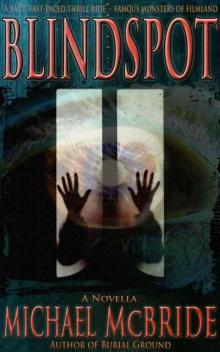 Blindspot
Blindspot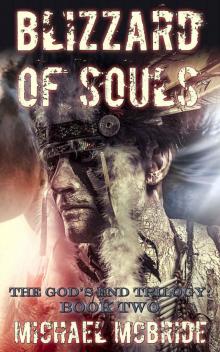 Blizzard of Souls
Blizzard of Souls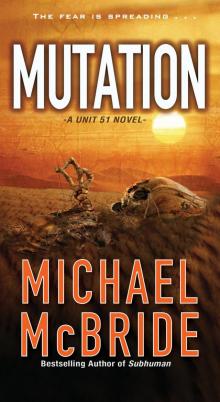 Mutation
Mutation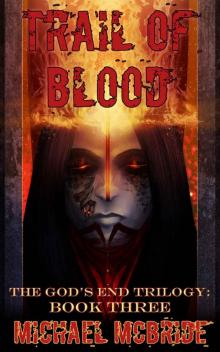 Trail of Blood
Trail of Blood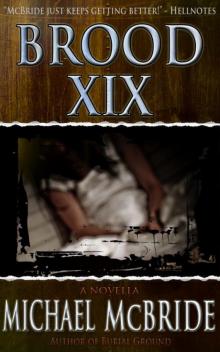 Brood XIX
Brood XIX The Fall
The Fall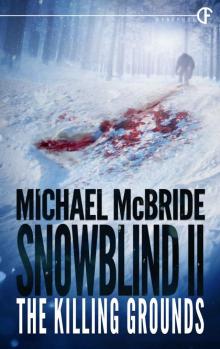 Snowblind II: The Killing Grounds
Snowblind II: The Killing Grounds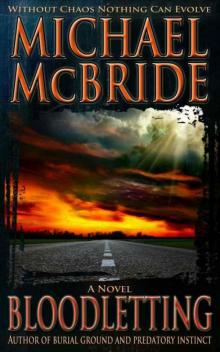 Bloodletting
Bloodletting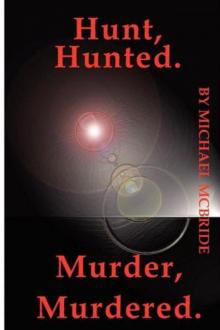 Hunt Hunted, Murder Murdered
Hunt Hunted, Murder Murdered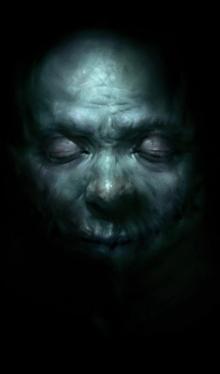 The Bloodspawn
The Bloodspawn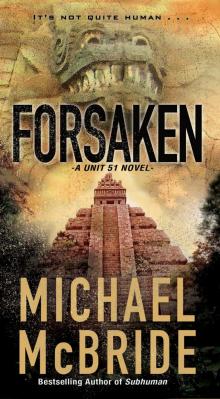 Forsaken
Forsaken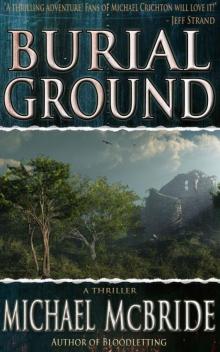 Burial Ground
Burial Ground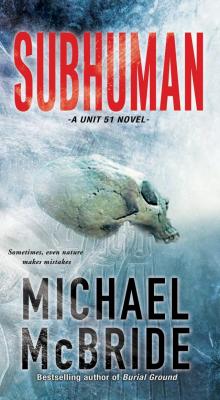 Subhuman
Subhuman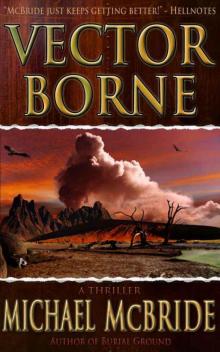 Vector Borne
Vector Borne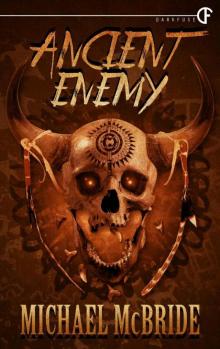 Ancient Enemy
Ancient Enemy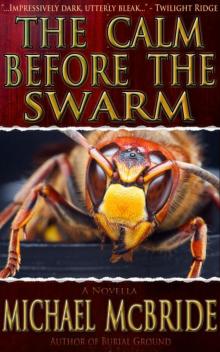 The Calm Before The Swarm
The Calm Before The Swarm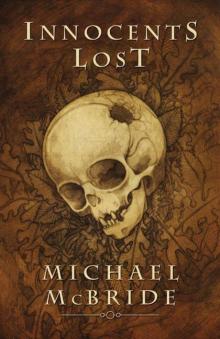 Innocents Lost
Innocents Lost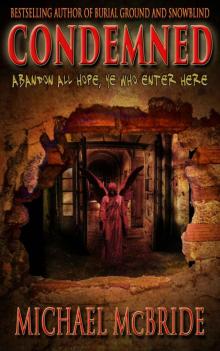 Condemned: A Thriller
Condemned: A Thriller